What are dental implants and how do they work?
A dental implant looks like a screw made of titanium and has a special coating that allows bone from the body to integrate with it when placed in the jaw. This process locks the screw into place. The implant itself is not the tooth but a hollow cylinder into which a single tooth or a device that holds multiple teeth can be screwed. Dental implants are the closest thing we have to replacing teeth naturally.
Who is a good candidate for dental implants?
Most people are good candidates for dental implants, although certain medical conditions can make it less favorable. Heavy smokers may face issues due to restricted blood flow from nicotine. People with uncontrolled diabetes or those on bone density drugs may also experience complications because these conditions affect healing. Uncontrolled gum disease is another factor that can lead to implant loss. Despite these issues, dental implants are stable and can last a lifetime in most cases. There are also different types of implants, such as mini implants for those with significant bone loss, offering more affordable options.
What is the dental implant process from start to finish?
The dental implant process begins with evaluating the bone to ensure there is enough density to support an implant. If everything looks good, a custom implant is chosen and placed in the bone, followed by a healing period of about three months. The procedure is generally painless, and recovery is quick. If a tooth needs extraction, placing an implant simultaneously can speed up the healing process and aid bone growth. If immediate implantation isn't possible, bone material is used to prepare the area, followed by another healing period before the implant is placed and later fitted with a tooth.
How long does a dental implant last?
A dental implant is expected to last a lifetime, similar to how one might expect a car to last a long time barring unforeseen accidents. As long as good oral hygiene is maintained, implants should last a very long time, making them a reliable dental solution.
Can dental implants get cavities?
No, dental implants cannot get cavities.
Do dental insurance cover the cost of implants?
Many dental insurance plans do offer some type of reimbursement or contribution towards the cost of dental implants. However, even if your insurance does not cover the cost, we have many options to help facilitate the treatment.
If you have more questions about dental implants or would like to schedule a consultation, please call us at (210) 972-0768.
What type of implant should I get?
It's crucial to know the type of implant you're getting. There are hundreds, if not thousands, of different brands, styles, or types of dental implants, and the one you receive matters. Some implants, though affordable, corrode over time and can build up toxins in your body. In our office, we use implants from two top companies in the world, Straumann and Nobel. These are made with a special type of titanium and have a long history of not corroding and remaining healthy.
How do you determine if a patient has enough bone for an implant?
We look at the height and width of the bone. We need enough support and foundation to ensure the implant has a solid structure for long-term use. If there isn't enough height or width, we can perform procedures to build up the bone to accommodate a dental implant.
What options are available for patients who have lost several teeth?
A common treatment option for missing teeth is dentures. Although dentures are a treatment option for replacing missing teeth, if you've ever asked anyone who has worn dentures, eating with them is often likened to walking on gravel barefoot. It can be done, but it's definitely not the most comfortable experience. Imagine having to do this every day for all three meals—it's akin to walking on gravel.
So, why is it like walking on gravel? A denture is a plastic piece that spans across both your upper and lower jaws, resting on the gums. The only way a denture stays in place is through the suction of saliva. However, despite this suction, food particles can still find their way in. As you eat, it feels like walking with a pebble inside your sock, causing discomfort, sore spots, ulcers, or blisters.
Another drawback of dentures is their size. Since they rely on suction, they must extend all the way back to your throat. This can pose issues for those with gag reflex problems or acid reflux. Additionally, the feeling of having a bulky piece of plastic in your mouth can be likened to wearing a thick mouthguard, making it challenging to speak, and many people have to relearn how to articulate.
Moreover, the absence of a feedback system, as with natural teeth, makes it difficult to gauge if you've chewed your food thoroughly. Eating becomes a challenging and uncomfortable experience. Dentures are also not a permanent solution; they often need replacement after a few years due to bone loss. Without the stimulation to the bone, it starts to recede, leading to a loose fit. The alternatives are either using excessive amounts of glue, which is inconvenient to clean, or investing in a new, expensive denture, knowing it will need refitting in a few years. Despite being a replacement for missing teeth, there are more modern options that prioritize comfort and help you achieve your functional and aesthetic goals.
Feedback from our patients who have tried dentures in our office echoes these challenges. Some report difficulty enjoying certain foods due to the limitations of dentures. The embarrassment of having to remove dentures in public places, like restaurants, to clean them is a common issue. For married individuals, it can impact intimacy, as dentures must be removed before bed to avoid health problems associated with leaving them in overnight.
Hygiene is crucial, as neglecting proper cleaning can lead to additional problems. Furthermore, bone loss caused by dentures can result in a gaunt, sunken appearance, causing individuals to age prematurely. Preserving bone health becomes essential for maintaining a youthful and normal aesthetic appearance.
While dentures are an option in our office, we acknowledge that there are more modern solutions available that not only enhance self-esteem but also improve overall function and ability.
Do patients have to see a specialist to have implants placed?
In a lot of dental offices, that is what has to happen. One thing that is amazingly unique about our office and our providers is that we can offer all these services under one roof. We formed our practice to be a place where all people can be cared for. We know it's hard enough to build trust with one dentist, let alone having to go out and meet a bunch of other strangers and other dentists.
We want to be a place that is a home for all people of all shapes, colors, and sizes. You can come in, come as you are, feel welcome, be at home, and know that we can care for the full spectrum of care that you need. We like to say your need is our specialty.
What is the All-on-Four or All-on-X procedure?
It is a procedure known as All-on-Four or All-on-X, and we perform this treatment for patients who are missing multiple teeth or have decayed teeth that are not suitable for any other type of restoration. This procedure becomes necessary when something significant has happened, and we need to replace all the teeth in a person's mouth.
What's particularly remarkable about the All-on-Four or All-on-X procedure is that we can strategically place implants in a person's mouth, typically requiring four to six implants. This allows us to fully restore a person's mouth to its previous state. The four to six implants are placed on the top and bottom, creating a strong structure that provides the same bite force and power the patient once had when their teeth were at their peak. This aspect makes the procedure truly remarkable.
Additionally, because the implants are inserted into the bone, as a person chews, it sends feedback to the bone, signaling the body to strengthen and reinforce the bone. This unique feature helps prevent the bone loss commonly observed with other tooth replacement alternatives that don't involve implants. Offering this procedure is truly a remarkable opportunity for our patients, and what's even more incredible is that the day you receive your implants is the day you get your teeth. There's never a moment where you're walking out of our office without a beaming smile.
Do dental implants hurt?
The good news is that, for most patients, the process of placing the implant is a relatively painless procedure. Initially, the area might feel tender, but it is most commonly managed with over-the-counter medications such as Advil or Tylenol. Typically, individuals who undergo the procedure can return to work the next day, and some even resume work on the same day. It's a highly minimally invasive procedure, especially when performed by a skilled surgeon. This results in minimal trauma, or none at all, facilitating a speedy recovery to full health without missing work or important events.
How do we mitigate pain during the procedure? In our office, we employ two main approaches. Firstly, we locally numb the area, similar to the numbing process for a filling or any other dental procedure. This ensures that patients don't feel the procedure being performed. While some vibrations may be felt during the actual placement of the implant, pain is typically non-existent when the area is numb.
The second approach to enhance comfort in our practice is by offering different sedation options. While the procedure is relatively quick, some patients prefer not to be awake during it. We can provide something that induces a deep state of relaxation or, through an IV, we can administer anesthesia to put you to sleep. This is advantageous because, from your perspective, it feels like a blink of an eye, and when you wake up, the entire procedure is complete. What may have felt like a split second for you was likely 15 to 30 minutes for us. The combination of these options ensures that our patients feel very comfortable during the procedure, leading to increased comfort and successful outcomes after the procedure.
For specific concerns or scenarios, please call our office at (210) 972-0768. We look forward to hearing from you and can't wait to care for you.
Of all the ways modern dentistry has to replace missing teeth, dental implants are by far the best. There is no tooth-replacement option that will give you a longer-lasting result. Implants also help preserve tooth-supporting bone that naturally deteriorates when a tooth is lost. Loss of bone is one of the major hidden consequences of losing teeth.
Dental Implant
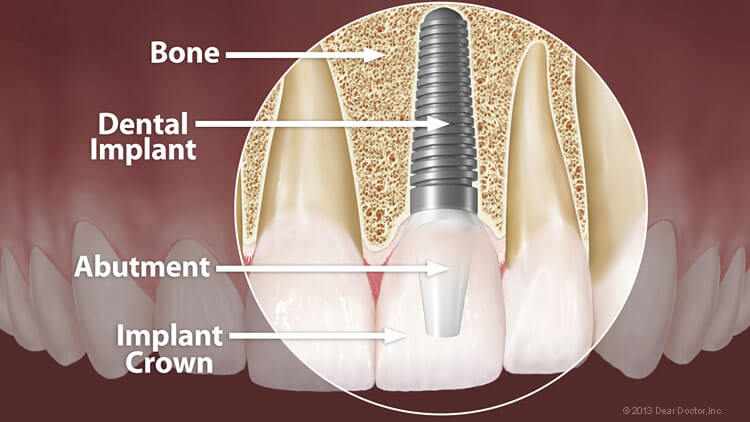
A dental implant most often takes the form of a small, screw-shaped titanium post that replaces the root-part of a missing tooth. The surgical procedure used to place an implant is actually quite minor and routine, requiring only local anesthesia in most cases. After a healing period, the implant is topped with a lifelike crown custom-made to match your existing natural teeth. Implants have a documented success rate of over 95%, which is significantly higher than any other tooth-replacement option.
How Implants Work
During a minor surgical procedure, your dental implant is inserted directly into the jawbone in the space vacated by the missing tooth. It will then be left to heal for a period of months before the final crown is attached. During this healing period, the implant actually fuses to the bone surrounding it.
Tooth Replacement Options Using Dental Implants
Implants can replace missing teeth in a variety of ways. They can be used to:
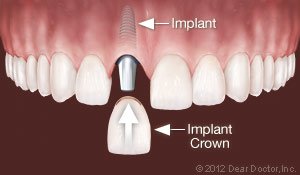
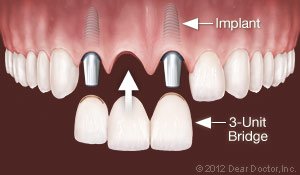
Dental Implants Replace One Tooth.
Replace One Tooth — When you have one tooth missing, a single implant is inserted into the bone to replace the root part of that tooth; a crown then goes on top to simulate an actual tooth. This treatment choice has the highest success rate, making it the best long-term investment for replacing a single missing tooth. Even if the initial cost is slightly higher than other options, it is the most cost-effective solution over time. An implant will never decay or need root canal treatment, and feels just like the tooth that was there.
Dental Implants Replace Multiple Teeth.
Replace Multiple Teeth — When you have more than one tooth missing, implants provide an ideal replacement mechanism. You don’t even need one implant for every missing tooth. Instead, implant teeth can act as supports for fixed bridgework. For example, if you are missing three teeth in a row, we can place two implants, one on either side of the gap, and a crown in between that has no implant underneath. That way, you won’t need to use any of your remaining natural teeth as bridge supports, which could weaken them and make them more susceptible to decay.
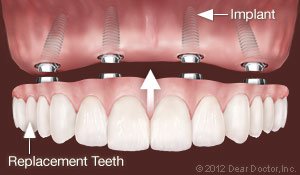
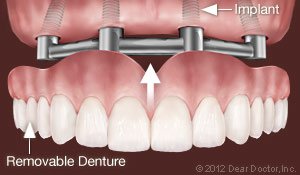
Dental Implants Replace All Teeth.
Replace All Teeth Permanently — Implants can support an entire arch of upper or lower replacement teeth that are fixed into the mouth and are never removed. Sometimes the new teeth can be supported by as few as 4 implants. It’s comparable to the structure of a table, which only needs 4 legs to hold it up. In cases where jawbone density and volume have deteriorated, 5 or 6 implants might be needed to support a row of 10 to 12 teeth. Dental implant replacement teeth protect your jawbone, won’t slip, and should last a lifetime.
Dental Implants Support Removable Dentures.
Support Removable Dentures — Implants can even make removable dentures more comfortable, effective and healthier to wear. Traditional dentures rest on the gums and put pressure on the underlying bone. This accelerates bone loss so that the jaw shrinks and the dentures slip, particularly on the bottom. But today dentists can attach a removable denture onto implants, transferring that pressure into the bone structure rather than the bone surface. This prevents the dentures from slipping while you eat and speak, and preserves the bone directly beneath them.
Implant Care and Maintenance
There are only two ways an implant can lose attachment to the bone and fail once it has successfully fused: poor oral hygiene or excessive biting forces. Poor oral hygiene and/or a lack of regular cleanings can lead to a destructive bacterial infection called peri-implantitis. Flossing and brushing your teeth on a daily basis, along with regular professional cleanings, can prevent this. Excessive biting forces can come from either a habit of clenching or grinding your teeth, or an insufficient number of implants to handle the forces generated by your bite. You should receive the correct number of implants so this does not happen. And if you have a habit of grinding or clenching your teeth, a nightguard will be recommended to protect your implants. After all, implants are a long-term investment in your smile, your health and your well-being, so it’s best to protect your investment.
Understanding Dental Implants: Your Path to a Restored Smile
Dental implants in San Antonio are a revolutionary solution for those struggling with missing teeth. At Inspire Dental, we recognize the importance of restoring not only your smile but also your confidence and overall oral health. So, what exactly are dental implants? Simply put, a dental implant is a titanium screw that is surgically inserted into the jawbone, serving as a sturdy foundation for a replacement tooth. After the area has healed, we can attach a natural-looking crown to the implant, seamlessly blending it with your existing teeth.
Why Choose Dental Implants?
Dental implants are often recommended by dentists for various reasons, primarily when a tooth has been lost due to factors such as injury, decay, or congenital absence. Conditions like a cracked tooth or a large cavity that cannot be salvaged can lead to the recommendation of dental implants. Unlike temporary tooth replacement options, dental implants in San Antonio offer a long-lasting solution that closely mimics the function and appearance of natural teeth.
Enhancing the Quality of Life with Dental Implants
One primary reason why we advocate for dental implants as the optimal solution for replacing missing teeth is their functionality. They act as an isolated tooth, which allows for easy flossing, regular cleaning, and straightforward maintenance, just like a natural tooth would. This not only simplifies your oral hygiene routine but also contributes to maintaining good oral health and wellness.
Aesthetic Appeal and Longevity of Dental Implants
When assessing tooth replacement options, the aesthetics that dental implants provide are often unmatched. Our team at Inspire Dental takes great pride in offering natural-looking dental implants that enhance your smile and boost your confidence. With the right care and maintenance, dental implants can last a lifetime, making them a remarkable investment in your oral health.
Alternative Solutions for Missing Teeth
While dental implants are our preferred option, it's essential to recognize that there are other solutions for missing teeth available. For instance, removable partial dentures can replace one or several missing teeth, yet they come with challenges. Frequent removal is necessary, and they can put additional stress on your natural teeth. Additionally, you can’t sleep with a partial denture, and food may become trapped underneath while you eat.
Bridges are another alternative that fills the gap created by missing teeth by anchoring to the surrounding teeth. Our office specializes in creating high-quality bridges that appear very natural. However, these can also have drawbacks; they span a gap, which may allow food particles to get caught beneath, and they typically last around ten years or less due to the difficulties involved in cleaning beneath the bridge.
In light of these factors, our recommendations for missing teeth solutions lean heavily towards dental implants. They offer a hassle-free care routine and long-lasting results that significantly enhance your quality of life.
Understanding the Dental Implant Process in San Antonio
The process of obtaining dental implants is straightforward yet involves specific steps to ensure success. Initially, we will conduct a thorough evaluation of your oral health, including X-rays and a review of your medical history. This allows us to determine if you're a suitable candidate for dental implants and discuss the best options tailored to your needs.
Once approved, the placement of the dental implant occurs through a surgical procedure. After the implant is inserted, the area requires time to heal—a period known as osseointegration—during which the jawbone grows around the implant, solidifying its structure. Following this healing period, which generally spans a few months, we will schedule a follow-up appointment to attach your custom-crafted crown, offering a finalized and natural-looking smile.
Finance Your Dental Implants with Ease
We understand that affordability can be a concern when considering dental implants. At Inspire Dental, we offer various dental care financing options to make your journey to a restored smile as accessible as possible. Our compassionate team is dedicated to providing affordable dental implants without compromising quality, ensuring you receive the best care while also considering your budget.
Support for Special Needs Patients
At Inspire Dental, we value inclusivity and offer specialized services, such as dental care for individuals with special needs. We recognize the unique challenges faced by this community and cater to their specific requirements, advocating for an approach that combines comfort and accessibility throughout the dental implant process.
Emergency Dental Care in San Antonio
Unexpected dental emergencies can happen at any time, which is why our office provides emergency dental services in San Antonio. If you find yourself facing a dental crisis, we encourage you to reach out to our team for prompt and compassionate care. Addressing emergencies quickly can significantly affect the outcome of your long-term oral health.
Why Choose Inspire Dental?
Inspire Dental stands out as a patient-centered dental practice committed to enhancing your oral health and well-being. By integrating the latest technology with compassionate care, we ensure that your experience is positive from start to finish. Our diverse and skilled team emphasizes education and awareness, empowering you with information about your dental options to make informed decisions.
Let Us Help You Achieve a Luminous Smile
Are you ready to explore the advantages of dental implants in San Antonio? We invite you to schedule a consultation at Inspire Dental, where our focus on comprehensive dental services, patient-centered care, and advanced techniques can help you achieve the smile you’ve always desired. Together, we can create long-lasting dental solutions that enhance your quality of life while using natural-looking dental implants to empower your confidence.
Connect with us today and take the first step towards a brighter, healthier smile!


